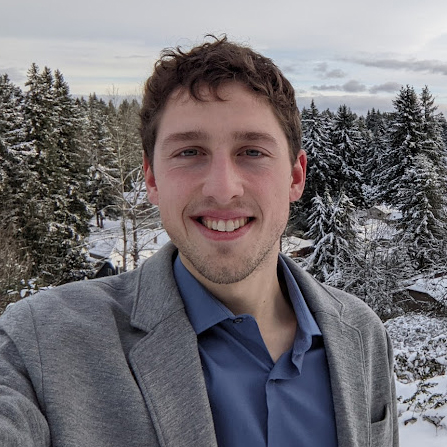Golob Wins Awards for Thesis on Data Privacy

Steven Golob came to UW Tacoma to study at the School of Engineering and Technology, though it wasn’t his first choice in majors, or even schools for that matter.
Golob studied music first at Central Washington University, and then at the University of Oregon, and he also studied creative writing at Evergreen College. Once he settled into computer science, however, he became laser-focused on it. So much so, that he decided to continue from his bachelor’s degree at UW Tacoma to graduate school here.
Now working on his Ph.D., Golob, 30, has won both the UW Distinguished Master’s Thesis Award for STEM, as well as the Western Association of Graduate Schools (WAGS) ProQuest Distinguished Thesis Award for his master’s thesis in privacy-preserving artificial intelligence. He is also a Carwein-Andrews Distinguished Fellow, an endowed fellowship that provides support for Ph.D. students in computer science at UW Tacoma.
“It took me a while to decide what I wanted to do,” Golob said. “I’d love a job where I could combine my interests – music, writing, teaching, research – but that’s hard to come by. I’m not that interested in working in industry. I like the freedom of academia.” Golob said that research is what keeps him occupied, and it also led to a master’s thesis that centered on synthetic data creation for A.I. training models. His thesis involved creating a “membership interference attack”, or an MIA, that challenged the data sets within the synthetic data and found vulnerabilities.
“Essentially, synthetic data is about taking private data, anonymizing it, and then publishing that and it can be used to train the A.I. models,” Golob said. “My thesis was that when you use these synthetic data creation techniques, there are still privacy leakages.” Golob said that he was originally more interested in building secure systems, rather than breaking someone else’s. “But it is important to do this because we don’t really know how safe these systems are before we use them in production,” he said.
For Golob, who is also a graduate assistant, the work he does, particularly his research, is more important to him than the immediate outcomes. “He cares more about the quality and significance of his research than about graduating or getting his paper published,” said Professor Martine De Cock, who has worked with Golob. De Cock also pointed out that like so many successful endeavors, Golob’s was not easy.
“The problem came from an international data science competition where participants were challenged to find privacy vulnerabilities in synthetic data generators,” De Cock said. “Steven had a lot of plausible ideas to go about doing this, yet they all failed, one by one.” Golob had worked on the problem since early summer of 2023, but began to despair that he would ever find an avenue to do the research that he wanted, according to De Cock. “I remember how in September he was ready to throw in the towel.” But Golob decided to try one more approach, and it was ultimately the one that allowed him to pursue his thesis, and eventually win that science competition as well as the awards for his thesis.
“Steven’s work can positively influence global privacy standards and strengthen privacy laws,” said Dr. Joy Williamson-Lott, dean of the UW Graduate School. “He and his work represent the best of the UW, the power of graduate education, and the invaluable contributions of graduate students to the public good.”
“A.I. models in general need all of this data to consume and train on, and I don’t know if synthetic data is much safer,” said Golob. “We’re trying to build all these tools that are shiny and new, but I’m a skeptic when it comes to the result,” he said. In his thesis summary, Golob wrote about the now 25-year-old example of when Massachusetts Governor William Weld and his science advisors said that they could create synthetic data from patient medical data that could be used for research. But Latanya Sweeney, then a Harvard computer science graduate student, mailed Weld’s personal medical records to him, proving that the synthetic data was not, in fact, anonymous.
“When I wrote the thing, I didn’t think it would get much notice,” Golob said. “But when it did, it made me realize that other people are thinking about this and it’s an important issue.”
“Steven's master thesis work has important practical implications,” said De Cock. “Exposing such privacy vulnerabilities, so that we can subsequently address them, is precisely what Steven did in his master thesis.
Golob will attend the WAGS award ceremony in Denver in March.



